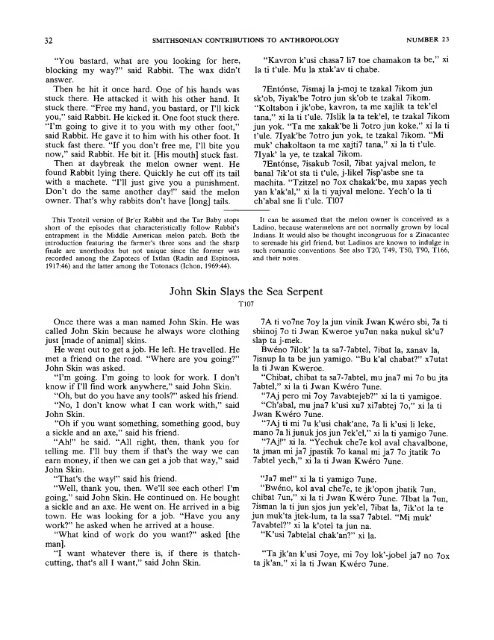PDF (Lo-Res) - Smithsonian Institution Libraries
PDF (Lo-Res) - Smithsonian Institution Libraries
PDF (Lo-Res) - Smithsonian Institution Libraries
You also want an ePaper? Increase the reach of your titles
YUMPU automatically turns print PDFs into web optimized ePapers that Google loves.
32 SMITHSONIAN CONTRIBUTIONS TO ANTHROPOLOGY NUMBER 23<br />
"You bastard, what are you looking for here,<br />
blocking my way?" said Rabbit. The wax didn't<br />
answer.<br />
Then he hit it once hard. One of his hands was<br />
stuck there. He attacked it with his other hand. It<br />
stuck there. "Free my hand, you bastard, or I'll kick<br />
you," said Rabbit. He kicked it. One foot stuck there.<br />
"I'm going to give it to you with my other foot,"<br />
said Rabbit. He gave it to him with his other foot. It<br />
stuck fast there. "If you don't free me, I'll bite you<br />
now," said Rabbit. He bit it. [His mouth] stuck fast.<br />
Then at daybreak the melon owner went. He<br />
found Rabbit lying there. Quickly he cut off its tail<br />
with a machete. "I'll just give you a punishment.<br />
Don't do the same another day!" said the melon<br />
owner. That's why rabbits don't have [long] tails.<br />
This Tzotzil version of Brer Rabbit and the Tar Baby stops<br />
short of the episodes that characteristically follow Rabbit's<br />
entrapment in the Middle American melon patch. Both the<br />
introduction featuring the farmer's three sons and the sharp<br />
finale are unorthodox but not unique since the former was<br />
recorded among the Zapotecs of Ixtlan (Radin and Espinosa,<br />
1917:46) and the latter among the Totonacs (Ichon, 1969:44).<br />
Once there was a man named John Skin. He was<br />
called John Skin because he always wore clothing<br />
just [made of animal] skins.<br />
He went out to get a job. He left. He travelled. He<br />
met a friend on the road. "Where are you going?"<br />
John Skin was asked.<br />
"I'm going. I'm going to look for work. I don't<br />
know if I'll find work anywhere," said John Skin.<br />
"Oh, but do you have any tools?" asked his friend.<br />
"No, I don't know what I can work with," said<br />
John Skin.<br />
"Oh if you want something, something good, buy<br />
a sickle and an axe," said his friend.<br />
"Ah!" he said. "All right, then, thank you for<br />
telling me. I'll buy them if that's the way we can<br />
earn money, if then we can get a job that way," said<br />
John Skin.<br />
"That's the way!" said his friend.<br />
"Well, thank you, then. We'll see each other! I'm<br />
going," said John Skin. He continued on. He bought<br />
a sickle and an axe. He went on. He arrived in a big<br />
town. He was looking for a job. "Have you any<br />
work?" he asked when he arrived at a house.<br />
"What kind of work do you want?" asked [the<br />
man].<br />
"I want whatever there is, if there is thatchcutting,<br />
that's all I want," said John Skin.<br />
John Skin Slays the Sea Serpent<br />
T107<br />
"Kavron k'usi chasa7 Ii7 toe chamakon ta be," xi<br />
la ti t'ule. Mu la xtak'av ti chabe.<br />
7Entonse, 7ismaj la j-moj te tzakal 7ikom jun<br />
sk'ob, 7iyak'be 7otro jun sk'ob te tzakal 7ikom.<br />
"Koltabon i jk'obe, kavron, ta me xajlik ta tek'el<br />
tana," xi la ti t'ule. 7Islik la ta tek'el, te tzakal 7ikom<br />
jun yok. "Ta me xakak'be li 7otro jun koke," xi la ti<br />
t'ule. 7Iyak'be 7otro jun yok, te tzakal 7ikom. "Mi<br />
muk' chakoltaon ta me xajti7 tana," xi la ti t'ule.<br />
7Iyak' la ye, te tzakal 7ikom.<br />
7Entonse, 7isakub 7osil, 7ibat yajval melon, te<br />
banal 7ik'ot sta ti t'ule, j-likel 7isp'asbe sne ta<br />
machita. "Tzitzel no 7ox chakak'be, mu xapas yech<br />
yan k'ak'al," xi la ti yajval melone. Yech'o la ti<br />
ch'abal sne li t'ule. T107<br />
It can be assumed that the melon owner is conceived as a<br />
Ladino, because watermelons are not normally grown by local<br />
Indians. It would also be thought incongruous for a Zinacantec<br />
to serenade his girl friend, but Ladinos are known to indulge in<br />
such romantic conventions. See also T20, T49, T50, T90, T166,<br />
and their notes.<br />
7A ti vo7ne 7oy la jun vinik Jwan Kwero sbi, 7a ti<br />
sbiinoj 7o ti Jwan Kweroe yu7un naka nukul sk'u7<br />
slap ta j-mek.<br />
Bweno 7ilok' la ta sa7-7abtel, 7ibat la, xanav la,<br />
7isnup la ta be jun yamigo. "Bu k'al chabat?" x7utat<br />
la ti Jwan Kweroe.<br />
"Chibat, chibat ta sa7-7abtel, mu jna7 mi 7o bu jta<br />
7abtel," xi la ti Jwan Kwero 7une.<br />
"7Aj pero mi 7oy 7avabtejeb?" xi la ti yamigoe.<br />
"Ch'abal, mu jna7 k'usi xu7 xi7abtej 7o," xi la ti<br />
Jwan Kwero 7une.<br />
"7Aj ti mi 7u k'usi chak'ane, 7a li k'usi li leke,<br />
mano 7a li junuk jos jun 7ek'el," xi la ti yamigo 7une.<br />
"7Aj!" xi la. "Yechuk che7e kol aval chavalbone,<br />
ta jman mi ja7 jpastik 7o kanal mi ja7 7o jtatik 7o<br />
7abtel yech," xi la ti Jwan Kwero 7une.<br />
"Ja7 me!" xi la ti yamigo 7une.<br />
"Bweno, kol aval che7e, te jk'opon jbatik 7un,<br />
chibat 7un," xi la ti Jwan Kwero 7une. 7Ibat la 7un,<br />
7isman la ti jun sjos jun yek'el, 7ibat la, 7ik'ot la te<br />
jun muk'ta jtek-lum, ta la ssa7 7abtel. "Mi muk'<br />
7avabtel?" xi la k'otel ta jun na.<br />
"K'usi 7abtelal chak'an?" xi la.<br />
"Ta jk'an k'usi 7oye, mi 7oy lok'-jobel ja7 no 7ox<br />
ta jk'an," xi la ti Jwan Kwero 7une.

















